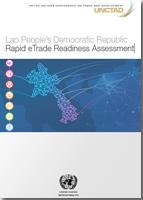
Lao PDR finds itself at the crossroads of e-commerce adoption. After having invested massively in ICT infrastructure to guarantee reliable access to mobile telephony and updated its legal and regulatory framework to adhere to its regional and international commitments, the Government needs to adopt ambitious policies in coming months regarding the acceleration of the use of ICT and e-commerce, as well as the creation of a supportive ecosystem for further social and economic development.
The e-commerce market in Lao PDR is set to take off amidst the rapid growth of Internet penetration in the region but the country does not have up-todate and supportive laws to regulate such activities. In particular, much-needed regulations for a national payment system, to accelerate the adoption of digital financial services, will be a key test of Government willingness to allow an uptake of e-commerce in the country. The cautious approach that the Government has taken over the years has resulted in Lao PDR losing out on the benefits from the growth of this form of business, especially compared with its immediate neighbours, as well as on the possibility to further diversify its economy and generate revenue from e-commerce.
The ability to leverage ICTs to boost innovation and online participation depends heavily on the availability of a reliable and cost-effective ICT infrastructure. Lao PDR MSMEs are unlikely to gain a competitive advantage where businesses and investors do not have ready access to global sources of knowledge and other resources and are relatively isolated from global markets.
Similarly, while access to finance is particularly challenging for informal enterprises, the difficulties that even formal MSMEs experience in obtaining bank credit diminishes the incentive for unregistered firms to formalize. The lack of innovative financial services available in the Lao PDR (such as mobile banking) is another missed opportunity to encourage businesses to formalize. If informal firms perceive they are missing out on the benefits of the mobile payments systems available to formal firms, then they could be more likely to formalize. While development of innovative financial products and mobile banking platforms may not directly address the lack of access to capital for MSMEs, these initiatives are an important aspect of financial inclusion. They will improve the efficiency and competitiveness of MSMEs, as well as their ability to integrate into value chains. In the longer term, the development of new financial products that are attractive to SMEs will encourage more enterprises to formalize.
The Government needs, finally, to play a vital role to incentivize entrepreneurship and boost a start-up culture in the country. Of late, some measures have been taken to collaborate with foreign institutions to encourage start-ups initiatives in the country. However, unless the government continues to pay attention to providing incentives and funding to start-up activities, digital progress might remain a slow process in the country.


